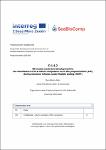3D heated mould tool development for the manufacture of PLA matrix composites via in situ polymerization (ISP) during monomer infusion under flexible tooling (MIFT)
| dc.contributor.author | Qin, Y | |
| dc.contributor.author | Summerscales, John | |
| dc.contributor.author | Cullen, R | |
| dc.contributor.author | Graham-Jones, Jasper | |
| dc.contributor.author | Meng, M | |
| dc.contributor.author | Pemberton, R | |
| dc.contributor.other | Interreg 2 Seas 2014-2020 | |
| dc.date.accessioned | 2023-05-05T14:02:11Z | |
| dc.date.available | 2023-05-05T14:02:11Z | |
| dc.date.issued | 2023-03-10 | |
| dc.identifier.other | SeaBioComp D 1.4.2 | |
| dc.identifier.uri | https://pearl.plymouth.ac.uk/handle/10026.1/20839 | |
| dc.description.abstract |
Due to the greater awareness of the environmental issues, the use of “greener” materials to substitute for synthetic fibre reinforcements and petrochemical polymer matrices is growing rapidly. Therefore, to minimise the ecological impact, the SeaBioComp project aims to produce natural fibre bio-based thermoplastic composites for marine applications. The University of Plymouth is developing monomer infusion under flexible tooling (MIFT) for the manufacture of bio-based composites via in situ polymerisation (ISP). The monomer material selection identified methyl methacrylate (MMA) for PMMA and L-lactide for PLA as potential matrix systems for marine composites. MMA can be processed at ambient temperature in a similar manner to conventional thermoset epoxy and polyester resins. However, L-lactide requires an elevated temperature between 100–200°C. There is a trend in using out of oven/autoclave processing for composite production due to the advantages including energy saving, lower equipment and operational costs, flexible in temperature adjustment, etc. Therefore, integrally heated mould tool attracts increasing attention, especially for large composite structure production. This report reviews the suitable materials for the mould tool and heating elements available on the market. Most importantly, the design of a 3D heated mould tool for an offshore wind turbine nacelle cover demonstrator is presented, and the achievement of sensible thermal uniformity has been investigated using an infrared camera as the temperature has a significant influence on the property of the final composite structure. | |
| dc.title | 3D heated mould tool development for the manufacture of PLA matrix composites via in situ polymerization (ISP) during monomer infusion under flexible tooling (MIFT) | |
| dc.type | report | |
| plymouth.confidential | true | |
| plymouth.organisational-group | |Plymouth | |
| plymouth.organisational-group | |Plymouth|Research Groups | |
| plymouth.organisational-group | |Plymouth|Faculty of Science and Engineering | |
| plymouth.organisational-group | |Plymouth|Faculty of Science and Engineering|School of Engineering, Computing and Mathematics | |
| plymouth.organisational-group | |Plymouth|Research Groups|Marine Institute | |
| plymouth.organisational-group | |Plymouth|REF 2021 Researchers by UoA | |
| plymouth.organisational-group | |Plymouth|Users by role | |
| plymouth.organisational-group | |Plymouth|Users by role|Academics | |
| plymouth.organisational-group | |Plymouth|REF 2021 Researchers by UoA|UoA12 Engineering | |
| plymouth.organisational-group | |Plymouth|REF 2021 Researchers by UoA|UoA12 Engineering|UoA12 Engineering MANUAL | |
| dc.date.updated | 2023-05-05T14:02:11Z |


